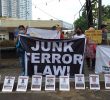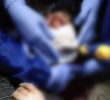DAVAO CITY. Philippines – Former Supreme Court justices Antonio Carpio and Conchita Carpio-Morales returned to the High Court as part of the 11th group that challenge the legality of the Anti-Terrorism Law.
The two legal luminaries are joined in the petition by University of the Philippines College of Law professors, former Supreme Court spokesperson Atty. Theodore Te, former Magdalo Party-list representative Ashley Acedillo and student leader Tierone James Santos.
In their 86-page petition filed on Wednesday, July 22, they are asking the Supreme Court to restrain the implementation of the anti-terror law, and to declare the entire law as unconstitutional.
Respondents of the petition include the Anti-Terrorism Council, the Senate and House of Representatives, Executive Secretary Salvador Medialdea, National Security Adviser Hermogenes Esperon, Defense Secretary Delfin Lorenzana, and other Cabinet members.
The Carpio cousins opted to file the petition on July 22, saying that this is the actual date the law is in effect 15 days after being published on print on July 6, and not published online on July 3.
The petitioners argued that the overbroad definition of terrorism will repress protected speech and other fundamental rights.
The petitioners said they are in danger of being prosecuted, since their advocacy to advance the country’s claim in the West Philippine Sea (WPS) may be construed as a terrorist act.
UP Law professors likewise pointed out that their classroom discussion where topics such as social movements, rebellion, extrajudicial killings and the WPS may be tagged by the ATC as an “advocacy” or “inciting to terror” under the vague and overbroad provisions of the ATA, and will impede their exercise of academic freedom,
They also noted how the National Task Force to End Local Communist Armed Conflict and several police stations nationwide had tagged legitimate activism and criticism as acts of “communist terrorism”.
They added that the creation of the Anti-Terrorism Council infringes the principle of separation of powers. The powers of the ATC are far greater than those given to the President in times of invasion and rebellion, including the arrest and detention on mere suspicion for a maximum of 24 days as well search and seizure of property without court intervention.
Morales, in a statement, said: “In its fight against terrorism, the government must not be the source of terror and impunity itself. We must never let reason continue to escape us.”
Prior to the law’s enactment, Carpio earlier warned that it would place the Philippines into a situation “worse than martial law”.
The Anti-Terror Law or RA 11479 was passed by the House of Representatives in a marathon session last June 3 and signed by President Rodrigo Duterte on July 3, amidst wide criticism from legal luminaries and rights advocates. (davaotoday.com)










